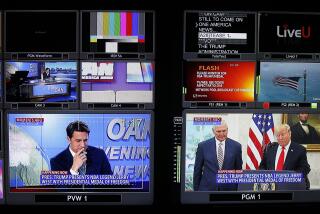Reader’s Digest to Settle Sweepstakes Claims
- Share via
SACRAMENTO — Reader’s Digest Assn. Inc., publisher of the world’s most widely read magazine, has agreed to pay more than $6 million to settle allegations that its promotions were misleading to customers in California, 30 other states and the District of Columbia, state officials said Thursday.
Reader’s Digest will pay $4 million to about 7,500 “high-activity customers” who spent more than $2,500 annually in 1998, 1999 or 2000, said state Atty. Gen. Bill Lockyer.
That includes $1.5 million split among 1,800 Californians, he said.
The multistate settlement is the fifth to be reached with a major sweepstakes company since state attorneys general held public hearings in 1999, Lockyer said. US Sales Corp., American Express Publishing Corp., Publishers Clearing House and Time Inc., now part of AOL Time Warner Inc., also have settled, he said.
“Through this and other recent settlements with sweepstakes companies, consumers will be able to clearly see that buying products will not improve their odds of winning,” Lockyer said.
Reader’s Digest publishes 48 editions in 19 languages and is read by more than 100 million readers each month.
Reader’s Digest spokeswoman Elizabeth Board told Bloomberg News that the company plans to issue a statement today.
Under the settlement, Reader’s Digest will refund $6 million to sweepstakes customers. The Pleasantville, N.Y.-based company also will provide notices in its sweepstakes mailings telling customers they don’t need to buy anything to enter.
Lockyer said the agreement bars the company from exaggerating a contestant’s chances of winning or suggesting that the recipient of a mailing is about to become a winner.
The company sends out millions of sweepstakes entries each year, most of which offer subscriptions to Reader’s Digest and other magazines, books, audiotapes and videotapes, Lockyer said.
New Jersey Atty. Gen. John J. Farmer Jr. said the deal will help sweepstakes contestants understand that “you don’t have to pay to play.”
The company also will send special letters to those who spent more than $1,000 in six months telling them they are not required to make purchases in order to have a chance in the sweepstakes.
Under the agreement, Reader’s Digest cannot say a consumer is about to be a winner or misrepresent the odds of winning, and cannot say the mailings were sent by special courier or special class if they weren’t.
The company also will pay $2 million in attorneys’ fees and investigation costs.
About 47% of new subscriptions for Reader’s Digest magazines in the fiscal year ended last June resulted from sweepstakes promotions, down from 89% the previous year, company spokesman William Adler told Bloomberg News last year.
Reader’s Digest hasn’t said how much it has spent on new marketing methods, including catalogs, newspaper inserts, television ads and non-sweepstakes direct mail.
The other states included in the settlement are: Alabama, Alaska, Arkansas, Georgia, Hawaii, Idaho, Illinois, Indiana, Kansas, Louisiana, Mississippi, Nebraska, Nevada, New Hampshire, New Jersey, New Mexico, New York, North Carolina, North Dakota, Ohio, Oklahoma, Oregon, Rhode Island, South Carolina, South Dakota, Tennessee, Utah, Virginia, Washington and Wyoming.
Reader’s Digest’s Class A shares fell 66 cents to close at $33.48 on the New York Stock Exchange.
More to Read
Sign up for our Book Club newsletter
Get the latest news, events and more from the Los Angeles Times Book Club, and help us get L.A. reading and talking.
You may occasionally receive promotional content from the Los Angeles Times.








